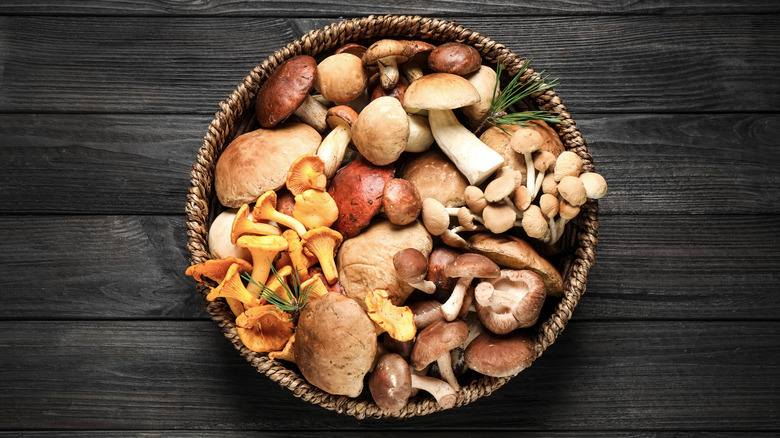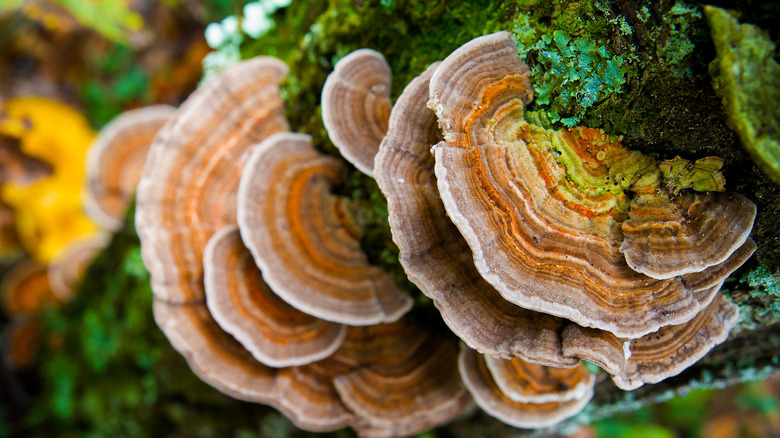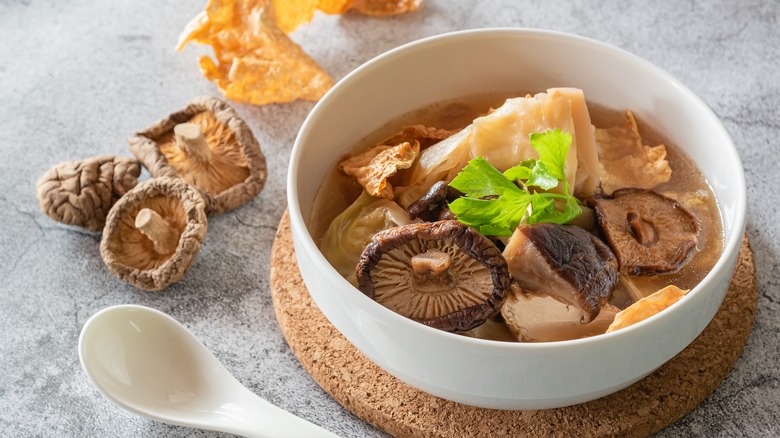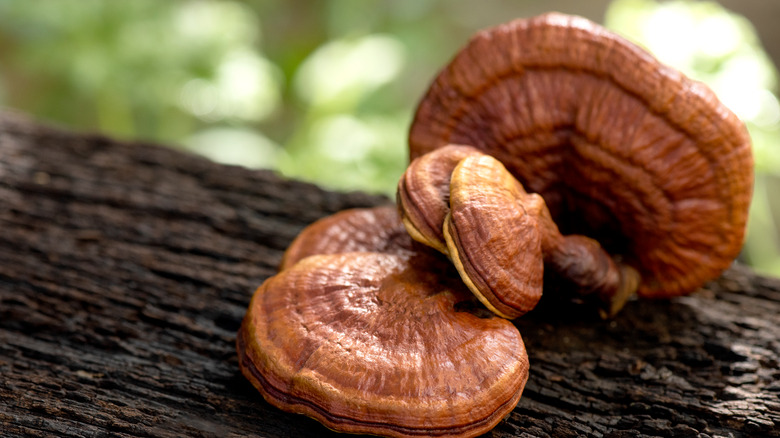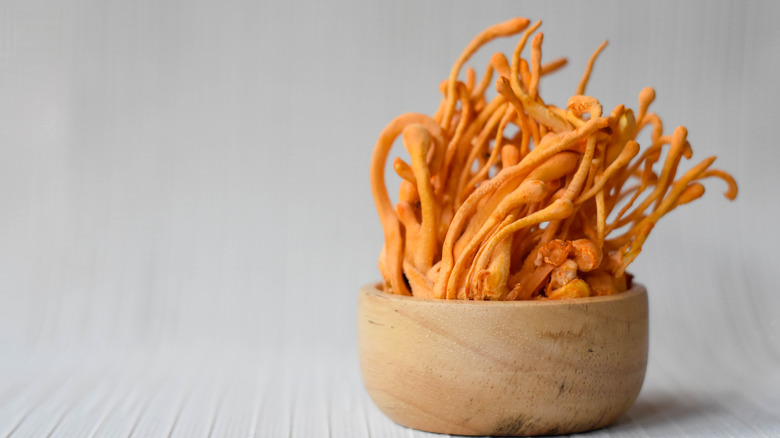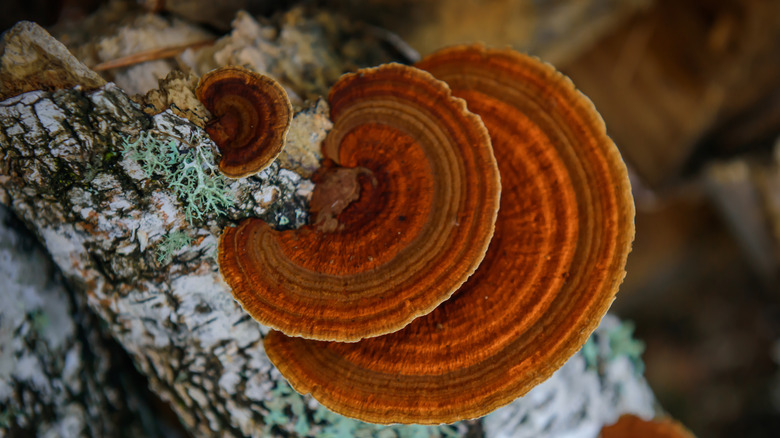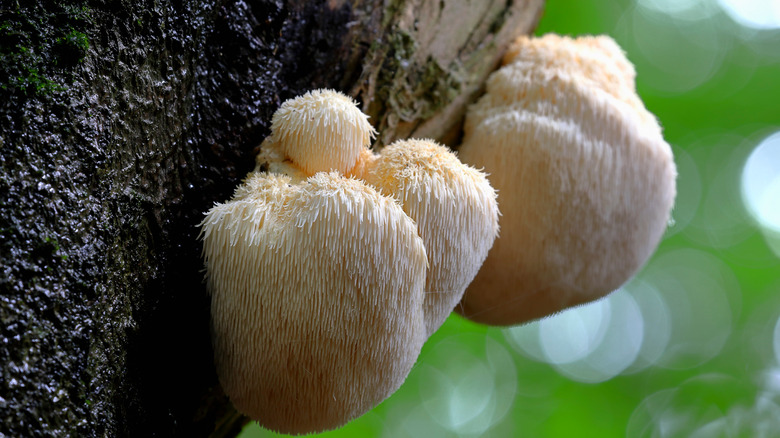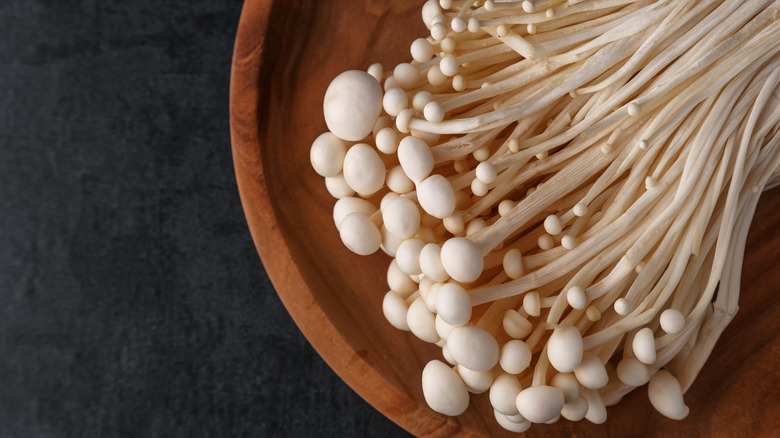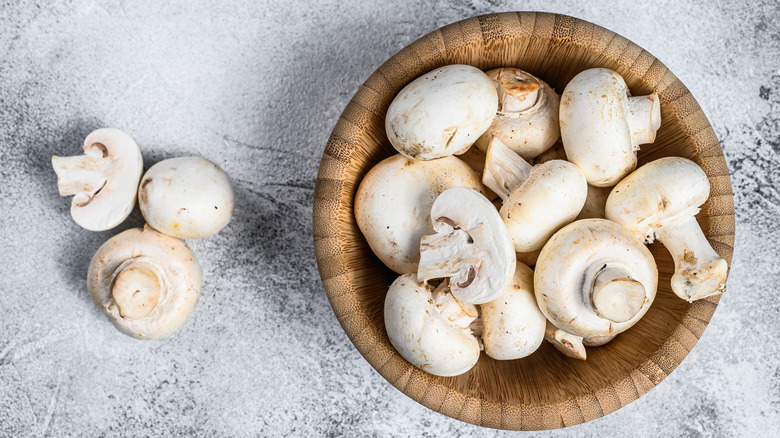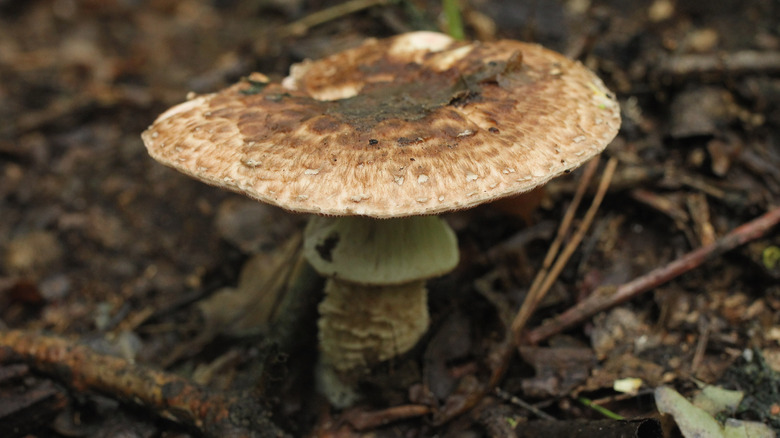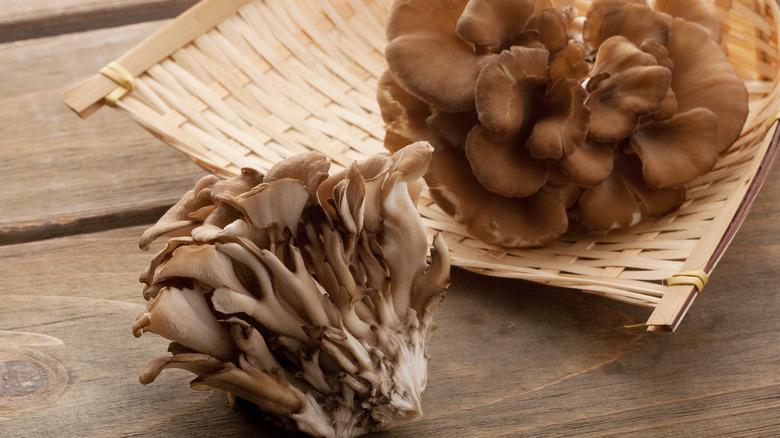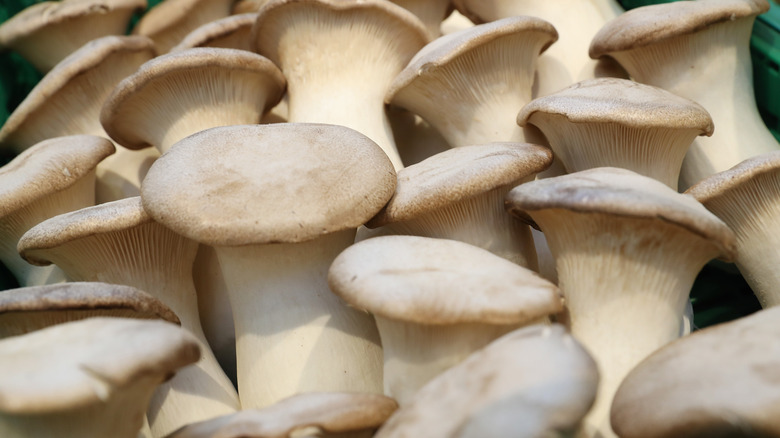12 Medicinal Mushrooms You Have To Try
We may receive a commission on purchases made from links.
For many, mushrooms are a love-it or hate-it ingredient. They're embraced by lots of chefs and home cooks alike for their ability to soak up flavors, and their nutritional qualities make them a good meat substitute. However, some people aren't a fan of their texture, which we admit can sometimes be slimy. Many simply don't love the fact that they're eating, well, a fungus. One Redditor even asked why people like to eat mushrooms when they taste rotten.
Even if you fall into the hate-it category, you'll find reasons to at least appreciate the fungi once you read about the many health benefits they offer. Mushrooms have long been used in traditional Chinese medicine. In fact, they were recognized for their medicinal qualities in some of the first recorded medical texts, Yinova Center notes.
There are likely over 100,000 species of mushrooms in the world, but as Today points out, only a fraction of them are known. Here are the ones that have been discovered to hold medicinal qualities.
Turkey Tail mushrooms
Turkey Tail mushrooms, or Trametes versicolor, got their common name due to their distinctive rings of color that resemble turkey feathers (per Healthline). In addition to offering visual appeal, the mushrooms may actually improve your immune system. This is in part because the fungi are packed with antioxidants, like phenols and flavonoids, that can reduce inflammation.
Turkey Tail is so well-regarded for its medicinal properties that the National Cancer Institute includes information on the health benefits of the mushroom for cancer patients on its website. The Institute notes Turkey Tail is often used in conjunction with other cancer treatments in Japan and China. Clinical trials uphold that consuming the mushroom confers benefits to cancer patients. Essentially, they can make treatment more effective, Healthline points out.
According to Leda Meredith's foraging website, Turkey Tail's tough mouthfeel is a bit undesirable. While it can't be prepared like other mushrooms, it still has a good flavor. She recommends using Turkey Tail as you would a bay leaf — meaning to add it during the cooking process of a dish, but remove it before eating. You can also choose a simpler option and find a capsule supplement of the stuff.
Shiitake mushrooms
If you're looking for an umami flavor bomb that also improves your immune system, shiitake mushrooms are a good bet. The mushrooms aren't just a delicious addition to a stir fry — they actually offer a range of health benefits. Health-conscious eaters will love that the fungus is low in carbs and also is a good source of fiber, vitamin D, vitamin B5, and many other vitamins and minerals (per Healthline).
Shiitakes contain polysaccharides, terpenoids, sterols, and lipids, which are known to boost immunity and lower cholesterol, Healthline reports. They're also a great option for vegetarians, as they contain similar amino acids (which form proteins) that are found in meat.
The fungus is known in Chinese medicine to improve longevity and circulation, Healthline points out. Some turn to the shiitakes for their potential cancer-fighting properties, but limited studies have been done to confirm these claims. If you want your homemade risotto to possibly improve your health, opt for those shiitakes next time you're at the store.
Reishi mushrooms
Reishi's medicinal reputation dates back millennia. In fact, the mushroom was mentioned in the seminal ancient Chinese medical text — Shennong Ben Cao Jing — which was reported to have been published between 206 BC and 8 AD (via the National Cancer Institute). The book highlighted Reishi's power to boost qi — or the life force —within all of us.
The mushroom, which grows on live trees, is still widely used in Eastern medicine today. According to Healthline, one of the main benefits of Reishi is its effect on the immune system. The fungus positively impacts white blood cells, which can help the cells fight infections. Reishi also is reported to improve mood, including helping with fatigue and depression.
Some studies also show reishi supplements can help with certain types of cancer (via the Memorial Sloan Kettering Cancer Center). However, researchers point out that these supplements should not replace conventional cancer treatment. Additionally, there are limited high-quality clinical studies so far to confirm their efficacy and safety, so more research needs to be done in this area.
Cordyceps mushrooms
Consuming a parasitic fungus that grows on insect larvae might not sound super appealing, but cordyceps mushrooms have been a staple in traditional Chinese medicine for centuries (per Verywell Health). According to Om Mushroom Superfood, cordyceps gained global intrigue in the early 1990s when record-breaking Chinese athletes revealed that their diet included the fungus.
While not technically a mushroom, the fungus is colloquially referred to as one and has a reputation for supporting endurance and vitality — thus its appeal to athletes. This is because consuming cordyceps increases the amount of oxygen in the blood, Om Mushroom Superfood notes. This can lead to increased energy levels and improved mood. The "mushroom" also contains prebiotic fiber, vitamins, and minerals that support a healthy gut and improve immunity.
It's most common to find the "caterpillar fungus" — as cordyceps is sometimes called due to its slender, finger-like shape — in capsules, tablets, or powdered varieties, Verywell Health notes. You can also add cordyceps extract to a drink mix of your own, or try out the probiotic elixir available from Shroomshot.
Chaga mushrooms
It's easy to miss chaga mushrooms when out foraging because they have an appearance similar to a burnt bit of a tree, WebMD notes. Pay attention to the bottom of birch trees, where chaga 'shrooms grow, because these fungi have been a popular health remedy in Eastern Europe for centuries. It's used in that area to make chaga tea, which is known to confer a number of benefits to the intestinal and immune systems.
Chaga mushrooms contain beta-D-glucans, which bring balance to the immune system, per WebMD. They do this through helping regulate the body's cytokines — the part of white blood cells that serve as a sort of chemical messengers — enabling cells to better communicate with each other to fight off infections (per MedicalNewsToday). Chaga's effect on a body's cytokines can also help reduce inflammation.
Drinking chaga tea can also help prevent stomach ulcers, WebMD points out. That's because elements in chaga prevent the bacteria that form stomach ulcers from properly communicating with other cells. As with other medicinal mushrooms, chaga are known to have cancer-fighting abilities, especially in terms of liver cancer (via the Cleveland Clinic). Some studies have shown that the fungus can slow liver cancer cell growth and potentially other types of cancer cells, too.
Lion's mane mushrooms
Lion's mane is one of the most infamous species of medicinal mushrooms. Named for its shaggy white appearance that resembles a lion's coif, this variety is no longer just consumed by niche audiences interested in natural wellness. The mushroom is actually beginning to pop up in retail coffee blends by brands like Four Sigmatic and Grind Coffee Roasters. Lion's mane is edible beyond being ground up in adaptogenic mushroom drinks. According to Om Mushrooms, the fungus is known to taste a bit like meaty seafood varieties like crab or lobster.
So why drink your morning brew with a little lion's mane mushroom mixed in? Because it's good for your brain. The fungus is actually known to support cognitive function because it contains compounds called nootropics, Om Mushrooms notes. These compounds can help stimulate nerve growth and repair, which is especially beneficial if you've had an injury or illness that affected your brain.
Because of its brain health effects, lion's mane mushrooms have been used to treat minor cognitive issues in older adults, per Verywell Mind. Additionally, some early research with mice suggests the 'shroom could assist with memory loss. Lion's mane could also help with mental health, including anxiety and depression.
Enoki mushrooms
Enoki mushrooms have quite a distinctive look. They grow in bunches of long, white spidery stems with tiny caps on top. While you might not see these in your average grocery store, they are a staple in a lot of Asian cooking and often used as a component in salads or brothy soups, Tasting Table says.
Beyond their value to the dinner table, enoki mushrooms could bring something to the medicine cabinet, too. The fungi are chock full of antioxidants — including caffeic acid, chlorogenic acid, and ellagic acid — which make them helpful in treating chronic conditions like heart disease and type 2 diabetes (via Healthline).
Enoki mushrooms can also help with memory loss and cognitive function, Healthline reports. In initial research with animals, extract from the 'shrooms not only increased the number of neurotransmitters in the train, but also protected against learning and memory impairments. Other research suggests that when paired with compounds from ginseng, another well-known herbal supplement, enoki mushrooms may improve brain function in rats with Alzheimer's disease.
Button mushrooms
One of the easiest mushrooms to find in any grocery store is the classic button mushroom, also known as a white mushroom. According to LiveStrong, it's actually the most commonly eaten variety of 'shroom in the world. After they grow to full maturity, button mushrooms are known as portabella mushrooms, Healthline says.
Button mushrooms may be ubiquitous, but they hold a serious nutritional punch. They're actually one of the few foods that contain bone-strengthening, immune-system fortifying vitamin D (per LiveStrong). This vitamin is important to human health because it helps us absorb calcium.
White mushrooms also have a range of B vitamins that confer health benefits, LiveStrong notes. These vitamins are important because they help us grow strong hair and nails, along with maintaining healthy nervous systems.
Sautéing some button mushrooms could also benefit your heart, per Healthline. They naturally contain a soluble fiber called beta-glucan that is known to lower blood cholesterol, thus reducing the risk for heart disease.
Agaricus mushrooms
Agaricus mushrooms, which are commonly referred to as sun mushrooms, are originally from Brazil but are now grown in other parts of the world (via RxList). According to Superfood Science, this variety of 'shroom is currently gaining a lot of traction in Japan as an extract.
This superfood is particularly renowned for its effect on type 2 diabetes. People with this disease sometimes suffer from insulin resistance, and sun mushrooms have been shown to work alongside medications to improve this condition, per RxList. Agaricus mushrooms also act as antioxidants, Superfood Science points out, and thus can help humans avoid infection and disease.
Some researchers have suggested that sun mushrooms can help combat the build-up of fats and cholesterol in your arteries. This condition, called arteriosclerosis, can lead to the "hardening" of your artery walls. However, RxList notes that there is still insufficient evidence to prove these 'shrooms have a real effect on the disease.
Stout camphor fungus
The stout camphor fungus is native to Taiwan, which is appropriate as its scientific name is taiwanofungus camphoratus. The mushroom is found only on one type of tree on the island country, the stout camphor tree, and actually causes a rot disease to form on it (via Global Fungal Red List Initiative).
The mushrooms have quite a reputation for their health benefits, but both the fungus and the tree are endangered species due to overcollection. Therefore, harvesting stout camphor fungus is now illegal in Taiwan. Poachers trying to earn a pretty penny are often arrested with the fungus, Taipei Times reports.
Stout camphor fungus is known in traditional Chinese medicine as a remedy for everything from fatigue to alcohol toxicity to itchiness (per Om Mushrooms). It's especially renowned for detoxifying benefits, as in from alcohol- or drug-related ailments. This also makes the fungus helpful as a pre- or post-workout beverage.
Maitake mushrooms
Maitake mushrooms, which are commonly referred to as hen-of-the-woods, are a favorite of many chefs due to their sturdy texture that holds up well in many types of dishes. They're ideal in low-and-slow cooking situations like braising or as a component of a stew, and pair well with smokey flavors (per FoodPrint). Additionally, they are ideal for eaters looking for added health benefits.
Like other medicinal mushrooms, maitake are high in bioactive polysaccharides, WebMD points out. This means the fungi can help fight tumor growth and boost your immune system. Hen-of-the-woods are full of a polysaccharide known as D-Fraction, which is known to improve immunity. In animal laboratory studies, the compounds in the mushroom appear to fight cancer — though more research needs to be done with humans to confirm this effect (via the Memorial Sloan Kettering Cancer Center).
You'll likely have to travel to a farmer's market or particularly well-stocked grocery store to find maitake mushrooms, or, you could forage for them yourself. If you're lucky, you might even end up with more than enough to share, as these fungi can reach 100 pounds in size (per Om Mushrooms).
Oyster mushrooms
You won't be shocked to learn that oyster mushrooms get their name because their appearance resembles a certain type of bivalve. The fungus, which comes in many varieties including king oyster mushrooms and pearl oyster mushrooms, is a favorite among many chefs as a vegetarian substitute (per FreshCap). This is because their meaty texture is reminiscent of the texture of scallops or calamari, Cook's Illustrated notes. The 'shrooms also offer 12% of the recommended daily intake of iron, something many vegetarians are deficient in.
As with most other medicinal mushrooms, oyster mushrooms can help boost immune systems and reduce heart health due to the beta-glucans and antioxidants that they contain, FreshCap explains. The mushrooms” high levels of vitamin D also help you build strong bones and lower high blood pressure.
If you want to get the health benefits the fungus offers, we suggest you stick with a classic and sautée them in butter with thyme and garlic. They also make a great addition to pasta or stir fry.
